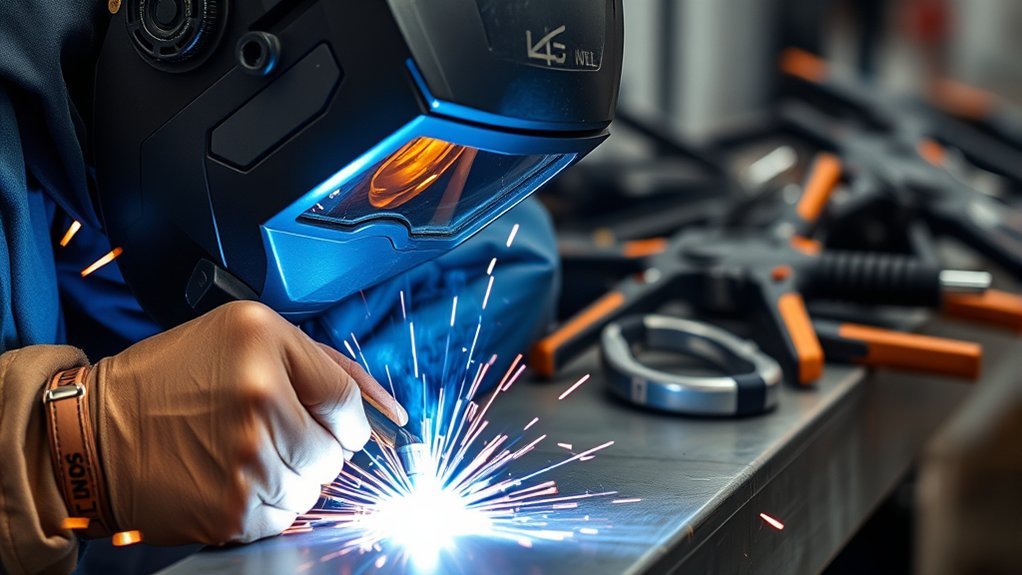Sill welding costs typically range from £350 to £1,000 based on the extent of repairs needed. Factors like the condition of your sill materials, the chosen welding technique, and labor time can greatly influence the final price. Expect to pay around £700 for full inner and outer replacements if both sides require work. Investing in professional services guarantees structural integrity and longevity. There’s much more to weigh when planning your repair options.
Understanding Sill Welding
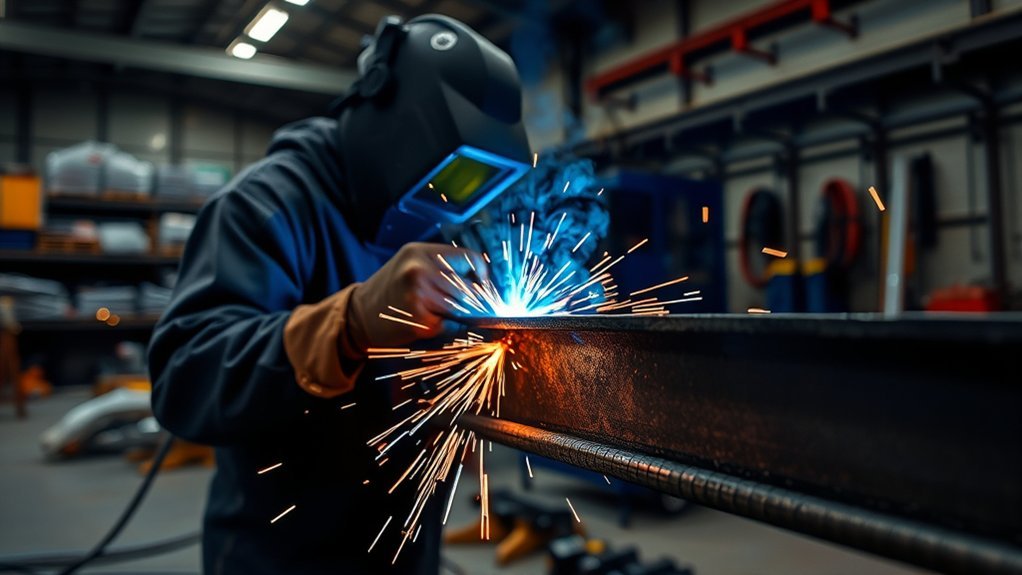
Sill welding is a crucial process in automotive repair, focusing on the vehicle’s sills—integral structural components that often fall victim to rust or damage over time.
To guarantee effective repairs, you should follow some essential sill maintenance tips. Regularly inspect sills for signs of corrosion and address any issues promptly to prevent extensive damage.
Regular inspections of sills for corrosion are vital; addressing issues promptly can prevent extensive damage.
When engaging in sill welding, always prioritize welding safety precautions, such as using appropriate personal protective equipment and working in well-ventilated areas.
Professional welders generally prefer fully welded joints for maximum structural integrity, particularly at jacking points where strength is essential.
Depending on damage levels, both inner and outer sill replacements may be necessary, requiring a careful assessment of the underlying metal for weldability.
Factors Influencing Sill Welding Costs
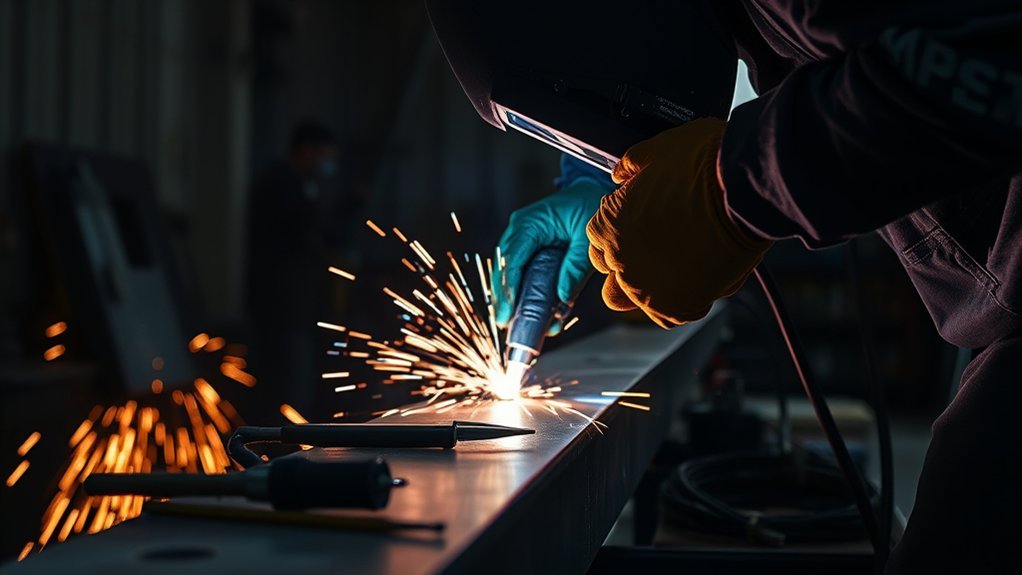
When considering the costs associated with sill welding, several key factors come into play that can greatly affect the overall price.
First, the condition of the sill materials and surrounding metal is vital; if underlying structures are compromised, additional repairs may escalate costs.
Also, the choice of repair techniques matters—professional welders might charge more if they need to start from scratch, emphasizing structural integrity.
The type of welding process used, whether continuous welds or tack welding, impacts pricing, with continuous welds generally being more expensive but recommended for essential areas.
Finally, the time required for the job—often 1 to 2 hours for smaller tasks—can influence your final bill considerably.
Estimated Costs for Inner and Outer Sill Replacement
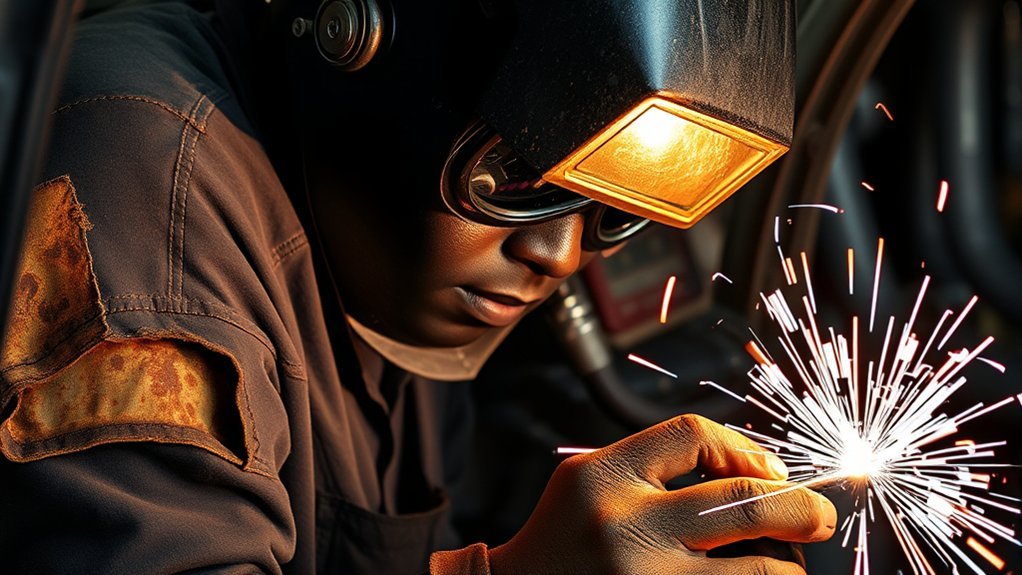
When you’re considering inner and outer sill replacement, it’s essential to understand the cost breakdown, which typically falls between £700 and £1,000.
This variation hinges on several factors, including the damage extent and necessary repairs.
Also, remember that individual estimates can reach around £350 per side, so being aware of these details helps you make informed decisions.
Cost Breakdown Overview
Understanding the costs associated with inner and outer sill replacement is essential, especially since these expenses can vary widely based on damage severity and repair requirements. Here’s a cost breakdown to help you gauge potential expenses:
| Cost Components | Estimated Costs |
|---|---|
| Inner Sill Replacement | £350 per side |
| Outer Sill Replacement | £350 per side |
| Both Sills Replacement | Starting at £700 |
| Multiple Areas Repair | Around £600 |
| Labor Costs (Preparation) | Variable |
Utilizing effective sill maintenance tips and implementing cost-saving strategies can minimize overall expenses. Be proactive in maintaining your vehicle’s sills to avoid costly repairs down the line.
Factors Influencing Prices
Several factors impact the prices for inner and outer sill replacements, making it important to evaluate specific circumstances before committing to repairs.
The estimated cost ranges from £700 to £1,000, influenced by sill types and the extent of damage. Professional welders typically charge around £350 per side for replacement, excluding parts and paint.
If you’ve previously replaced multiple areas, costs may vary, as seen in a reported £600 job. Preparation work, such as removing old sills, can lower expenses but isn’t always preferred by welders.
Additionally, using continuous welds is essential for structural integrity; this method generally incurs higher costs compared to tacked sections.
Consider these factors carefully to make informed decisions regarding your repair methods.
Professional vs. DIY Sill Welding
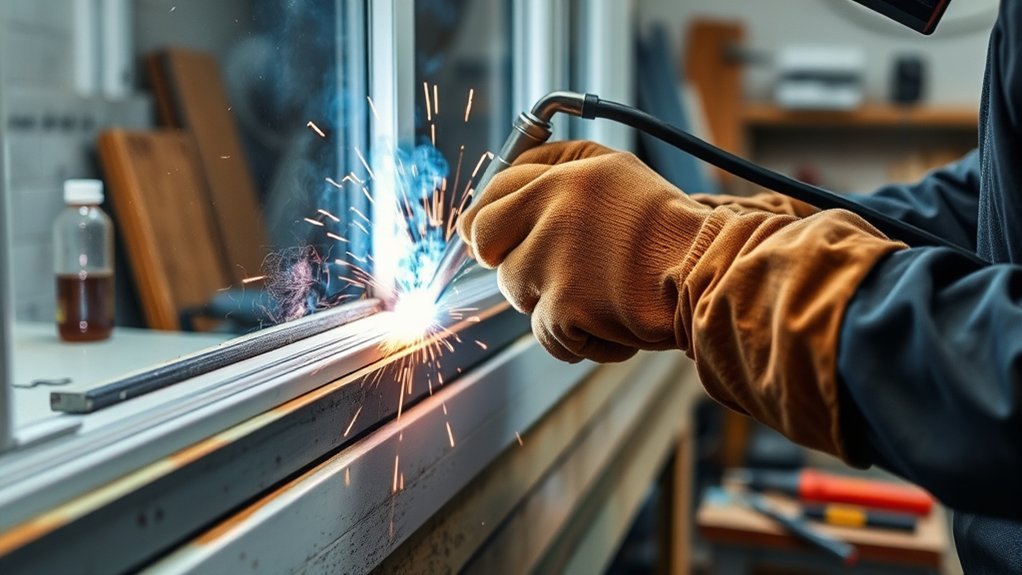
While weighing the costs and benefits of professional versus DIY sill welding, it’s vital to recognize that each approach carries its own set of advantages and challenges.
| Aspect | Professional Sill Welding | DIY Sill Welding |
|---|---|---|
| Cost | £350 per side, up to £700 total | Potentially lower, skill-dependent |
| Skill Requirement | Experienced welders | Learning required, e.g., MIG |
| Quality Assurance | High, ensuring structural integrity | Variable, risk of improper welds |
| Personal Satisfaction | Less involvement | High, sense of achievement |
Professional welders utilize proper sill welding techniques, ensuring durability. DIY can be a cost-saving strategy, but mastering welding techniques and safety is vital for successful repairs.
Importance of Structural Integrity in Sill Repairs
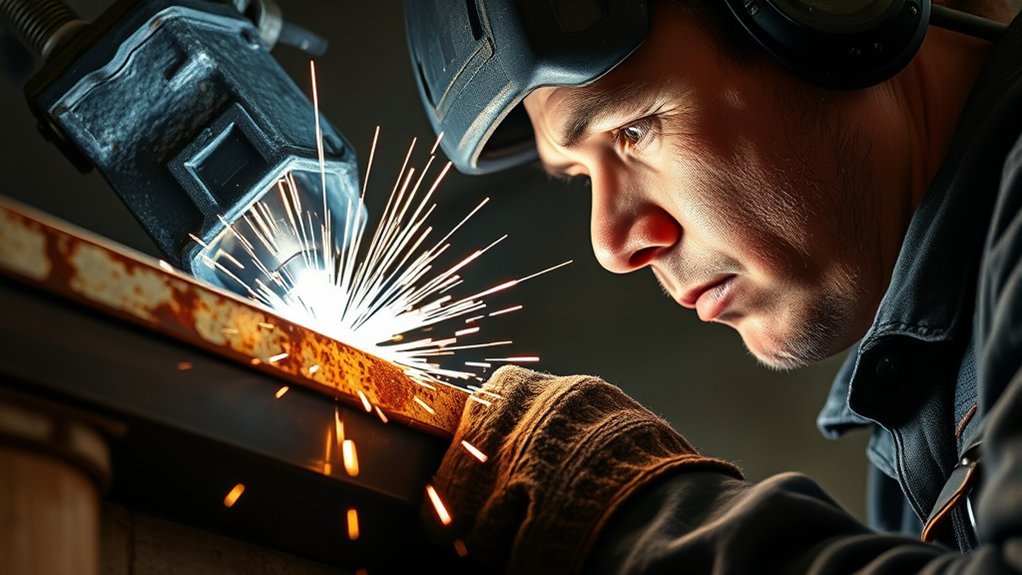
When addressing sill repairs, you must recognize the critical role sills play in maintaining the vehicle’s structural integrity.
Opting for continuous welds over tacked sections enhances strength and reduces the risk of failure, while evaluating the condition of surrounding metal is essential for a thorough repair.
Long-term considerations, such as rust protection and the potential need for complete replacements, can greatly influence both safety and longevity.
Role of Sills
Sills serve as essential structural components in vehicles, directly influencing the chassis’s support and the overall integrity of the vehicle body. Their design is significant for maintaining rigidity, especially since they act as crucial jacking points.
When sills are damaged or rusted, the safety impact can be substantial, affecting handling and alignment. Proper repair is non-negotiable; continuous welds are preferred over tacked sections to guarantee a robust bond and prevent future structural issues.
Professional welders stress the importance of thorough assessments and the use of correct techniques to meet safety standards. By prioritizing the condition of your sills, you enhance not only performance but also the vehicle’s long-term durability, securing a safer driving experience.
Welding Techniques Comparison
Effective welding techniques are essential for guaranteeing the structural integrity of sill repairs. The choice of welding materials and joint types directly impacts the durability and safety of the repair.
Consider these key factors:
- Continuous Welds: Recommended for structural areas, they provide the strongest bond, resisting stress and corrosion effectively.
- Fully Welded Joints: Preferable over spot welding, they maintain strength and enhance durability, critical for sill integrity.
- Material Assessment: Before welding, assess the underlying metal’s condition; compromised material can undermine repair quality and safety.
Utilizing these methods not only enhances the repair process but also guarantees that your vehicle maintains its structural support, which is essential for overall performance and safety.
Long-term Repair Considerations
Maintaining structural integrity during sill repairs is vital, as compromised sills can lead to significant safety risks and increased repair costs over time.
To guarantee long-term durability, opt for continuous welds rather than tacked sections, especially in areas that bear weight. Assess the underlying metal for weldability; rusted sections can undermine the repair’s effectiveness and the vehicle’s safety.
Professional welders frequently recommend complete replacements instead of patching, as this method addresses structural concerns more thoroughly. Additionally, incorporating rust prevention measures during repairs is essential to extending the life of your sills.
While initial costs may start around £350 per side, investing in quality workmanship now will save you from future issues and expenses.
Community Insights on Sill Welding Experiences
How can community experiences shape your understanding of sill welding costs? By tapping into shared insights, you can better navigate repair challenges.
Here are three key takeaways from community discussions:
- Cost Variability: Members reported sill replacement costs ranging from £350 to £700, highly dependent on damage extent and specific repairs.
- Professional Preferences: Many professionals favor starting new jobs instead of completing partial repairs, underscoring the importance of structural integrity.
- DIY Benefits: Engaging in DIY welding, particularly learning MIG welding, not only saves costs but also provides personal satisfaction from executing your repairs.
These community experiences offer invaluable context, helping you make informed decisions about your sill welding projects.
Frequently Asked Questions
How Long Does the Sill Welding Process Usually Take?
Sill welding typically takes a few hours, depending on the techniques used and project complexity. You’ll need to prioritize welding safety throughout the process to guarantee both efficiency and quality in your work.
Can I Drive My Car During the Welding Process?
You can’t drive your car during the welding process; safety precautions are vital. Moving or attempting to use the vehicle while welding is being carried out is unsafe for both you and the welder. Stay put until the work’s complete to guarantee your safety and quality results.
What Materials Are Commonly Used for Sill Repairs?
For sill repairs, you’ll commonly use mild or galvanized steel panels to match the original structure, and in some cases aluminum. Stainless steel is more often used for trim pieces than for the main structural sill. Effective welding techniques like MIG or TIG guarantee strong, durable bonds, enhancing structural integrity while preventing rust and corrosion in your repairs.
Are There Any Warranties on Sill Welding Services?
Yes, many contractors offer sill welding warranties and service guarantees. These warranties typically cover workmanship and materials, ensuring you receive quality repairs. Always ask for details to understand the coverage and duration before hiring a service provider.
How Can I Prevent Future Sill Damage?
To prevent future sill damage, implement regular sill maintenance tips, including thorough inspections and immediate repairs. Use effective rust prevention techniques, like applying protective coatings, to shield against moisture and environmental factors that lead to deterioration.
Conclusion
In summary, understanding the costs associated with sill welding is essential for maintaining your vehicle’s structural integrity. While prices can vary based on factors like location and the extent of damage, investing in professional services often proves invaluable. Don’t underestimate the importance of sound repairs—neglecting them can lead to catastrophic consequences, like a house of cards collapsing. By weighing your options and gathering insights, you can make informed decisions that guarantee your vehicle remains safe and reliable.

